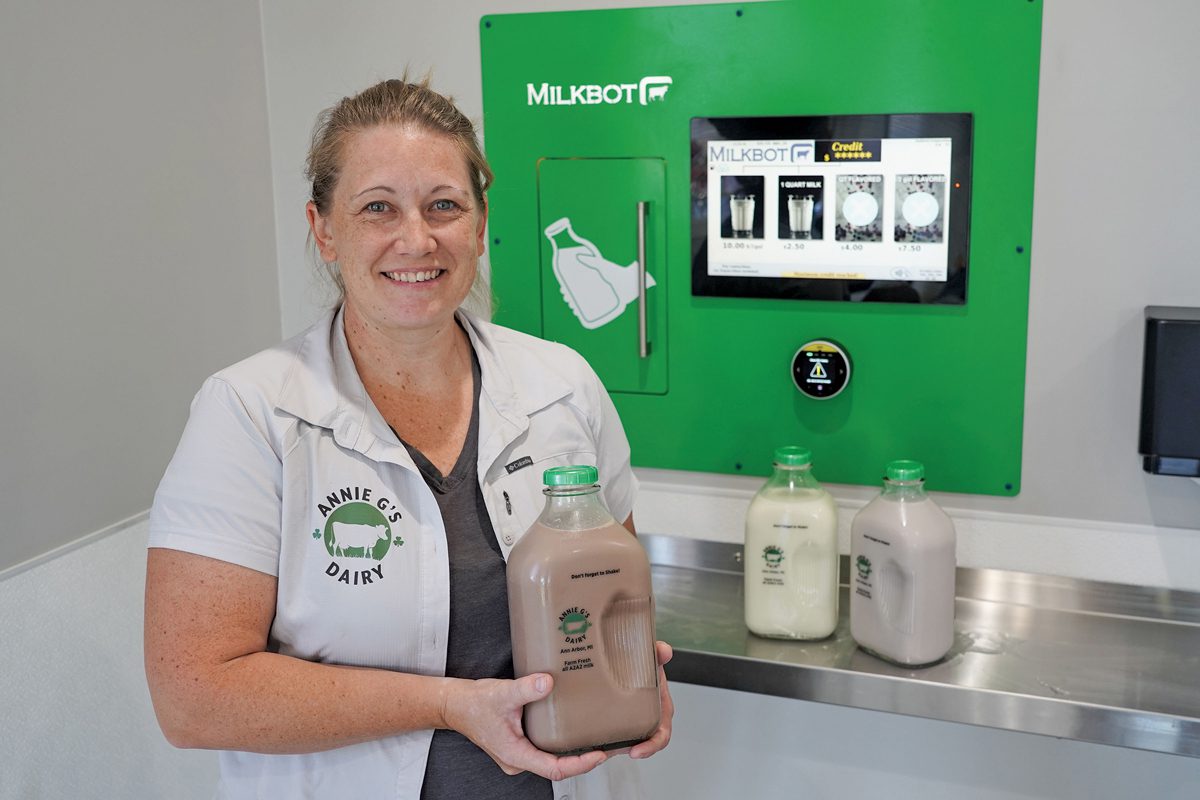
Kat Mageean and her husband Dave named Annie G’s Dairy for their children, Annie and Gus. Like Kat, they’re growing up on the farm her great-grandfather bought in 1924. | Photo by J. Adrian Wylie
The nation’s first retail milk vending machine is now open in Lodi Twp. It’s part of a longtime family farm’s strategy to sustain its operation for another generation.
The small storefront at Annie G’s Dairy, on Pleasant Lake Rd. west of Zeeb, culminates a multifaceted, multiyear project by Dave and Kat (née Lambarth) Mageean, the husband-and-wife team who took over her family’s farm in 2017. It’s named for their two young children, Annie and Gus, who, like Kat, have been growing up on the farm Kat’s great-grandfather bought in 1924 for $8,000.
Milking just 100 cows, she says, “we knew we were gonna have to do something niche.” In addition to their wholesale sales to a dairy cooperative, they decided to try selling directly to consumers “and and capture some more of that margin.”
When customers walk through the refinished doors salvaged from the historic Howell Carnegie District Library, they see a Czech-made Milkbot touch-screen device from which to fill glass bottles with farm-fresh, pasteurized whole milk. Its built-in payment system doesn’t translate to the U.S. market or accommodate other products they may eventually offer, but someone—most likely Kat—will usher them through the process and cash them out.
It’s $2.50 per quart or $5 per half-gallon ($4/$7.50 with chocolate or strawberry syrup). An initial bottle deposit lets returning customers exchange their used bottles for fresh ones. The milk, labeled for a two-week shelf life, is not homogenized, so cream tends to rise to the top.
Their closed herd of various breeds is strictly of the A2A2 genetic variety of the beta-casein protein. While that won’t help those with true lactose intolerance, Kat says that it’s considered easier for people with some dairy sensitivity to digest.
Related: MIFarmLink
Farming 2.0
The farm, now double its original 120 acres, consists of the family home, pasture, and cropland for feeding the herd of some 150 cows (including young stock and the dry cows pregnant with calves), a 109-stall barn they custom-built in 2020, and the facility including the storefront, new pasteurization equipment, and refrigerated storage.
Robotic milkers let the cows give milk on their own schedules, as three-dimensional cameras help the system identify each animal to customize the regimen and provide production data.
Kat and Dave met in New Zealand while both were on extended work travel. She’s a veterinarian, while he grew up in a Northern Ireland farming family. He trained as a structural engineer, but found more fulfillment in farm life, traveling the world as an artificial insemination technician.
Both of their backgrounds have gone to good use in modernizing a dairy operation focused on animal health, efficiency, and regenerative agriculture, all essential considerations in a low-margin business. The new barn was built with conscious choices about airflow, footing, and cow comfort. The cows themselves have been bred for smaller frames to more efficiently traverse pasture.
“If we have to intervene in a sick calf or a sick cow, it’s a really bad day,” Kat explains. “So the way we’ve set up protocols on our health care and even how we built our barn and designed it, we just don’t want any problems.”
Annie G’s Dairy, 6130 Pleasant Lake Rd. Tues.–Fri. noon–6 p.m., Sat. & Sun. 10 a.m.–6 p.m. Closed Mon. facebook.com/p/annie-gs-dairy-61550642879167
In 1957 our apartment building in Brooklyn, New York had a refrigerated milk vending machine in the lobby-level stairwell. You put in a quarter, pushed the appropriate button and a quart container of milk emerged from the metal chute. I remember the machine had four buttons – two of the buttons were ususally reserved for whole homogenized milk, one was for the chocolate milk I was never allowed to buy, and I don’t remember what the remaining button provided.
Twenty-five cents was a lot of money to pay for a quart of milk in those days, so my parents only sent me down to the machine when we ran out of the less-expensive milk we bought at the local supermarket. But you didn’t want to run out of milk late on a Sunday because the machine was usually empty by sometime Sunday afternoon.